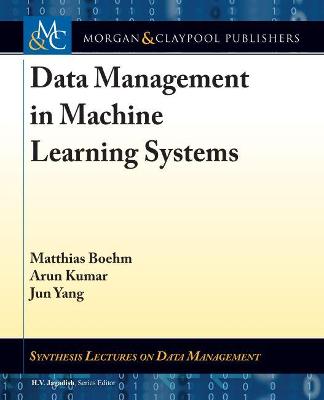Synthesis Lectures on Data Management
1 total work
Data Management in Machine Learning Systems
by Matthias Boehm, Arun Kumar, and Jun Yang
Published 25 February 2019
Large-scale data analytics using machine learning (ML) underpins many modern data-driven applications. ML systems provide means of specifying and executing these ML workloads in an efficient and scalable manner. Data management is at the heart of many ML systems due to data-driven application characteristics, data-centric workload characteristics, and system architectures inspired by classical data management techniques.
In this book, we follow this data-centric view of ML systems and aim to provide a comprehensive overview of data management in ML systems for the end-to-end data science or ML lifecycle. We review multiple interconnected lines of work: (1) ML support in database (DB) systems, (2) DB-inspired ML systems, and (3) ML lifecycle systems. Covered topics include: in-database analytics via query generation and user-defined functions, factorized and statistical-relational learning; optimizing compilers for ML workloads; execution strategies and hardware accelerators; data access methods such as compression, partitioning and indexing; resource elasticity and cloud markets; as well as systems for data preparation for ML, model selection, model management, model debugging, and model serving. Given the rapidly evolving field, we strive for a balance between an up-to-date survey of ML systems, an overview of the underlying concepts and techniques, as well as pointers to open research questions. Hence, this book might serve as a starting point for both systems researchers and developers.
In this book, we follow this data-centric view of ML systems and aim to provide a comprehensive overview of data management in ML systems for the end-to-end data science or ML lifecycle. We review multiple interconnected lines of work: (1) ML support in database (DB) systems, (2) DB-inspired ML systems, and (3) ML lifecycle systems. Covered topics include: in-database analytics via query generation and user-defined functions, factorized and statistical-relational learning; optimizing compilers for ML workloads; execution strategies and hardware accelerators; data access methods such as compression, partitioning and indexing; resource elasticity and cloud markets; as well as systems for data preparation for ML, model selection, model management, model debugging, and model serving. Given the rapidly evolving field, we strive for a balance between an up-to-date survey of ML systems, an overview of the underlying concepts and techniques, as well as pointers to open research questions. Hence, this book might serve as a starting point for both systems researchers and developers.
